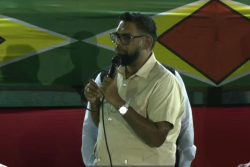MINSK, (Reuters) – The leaders of Germany, France, Russia and Ukraine have agreed a deal to end fighting in eastern Ukraine, participants at the summit talks said today.
The deal reached after all-night negotiations in the Belarussian capital Minsk included a ceasefire that would come into effect on Feb. 15, followed by the withdrawal of heavy weapons.
The news came as Ukraine was offered a $40-billion lifeline by the International Monetary Fund to stave off financial collapse.
The Minsk summit agreement offered hope for eastern Ukraine, German Chancellor Angela Merkel’s spokesman said.
“After 17 hours, negotiations in Minsk have finished: ceasefire from Feb. 15 at zero hours, then withdrawal of heavy weapons. Therein lies hope,” Merkel’s spokesman Steffen Seibert said on Twitter.
“We have managed to agree on the main issues,” Russian President Vladimir Putin said.
The four leaders had committed to respect Ukraine’s sovereignty and territorial integrity, according to a joint declaration distributed by the Kremlin.
“The main thing which has been achieved is that from Saturday into Sunday there should be declared without any conditions at all, a general ceasefire,” Ukrainian President Petro Poroshenko told journalists.
French President Francois Hollande said there was still much work to be done on the Ukraine crisis, but the agreement was a real chance to ameliorate the situation.
He said pro-Russian separatists, who had at one point appeared to reject the deal, had signed up to it.
Merkel and Hollande joined Poroshenko and Putin for a marathon negotiating session that began early on Wednesday evening and continued into Thursday morning.
The summit discussions came as pro-Moscow separatists tightened the pressure on Kiev by launching some of the war’s worst fighting on Wednesday, killing 19 Ukrainian soldiers in assaults near the railway town of Debaltseve.
As the fighting escalated, Washington has begun openly talking of arming Ukraine to defend itself from “Russian aggression”, raising the prospect of a proxy war in the heart of Europe between Cold War foes.
The outcome of the Minsk talks is expected to influence discussions at an EU summit in Brussels on Thursday, when sanctions against Moscow will be on the agenda. A deal would likely mean a softer line towards Moscow.
Merkel and Hollande were expected to arrive late for the Brussels meeting but would urge the European Union to support the Minsk deal.
FUND BAILOUT
The talks took place as an International Monetary Fund mission agreed a bailout to save Ukraine from bankruptcy.
The Fund provisionally agreed a $17.5 billion facility with Ukraine, part of a $40 billion funding package, IMF managing director Christine Lagarde said.
Kiev and NATO accuse Russia of supplying separatists with men and weapons. Moscow denies it is involved in fighting for territory Putin calls “New Russia”.
As the French and German leaders peace initiative was announced, pro-Russian rebels appeared determined to drive home their advantage ahead of a deal.
Armoured columns of Russian-speaking soldiers with no insignia have been advancing for days around Debaltseve, which has seen heavy fighting in recent days.
On the Russian side of the border, Moscow has begun military exercises in 12 regions involving more than 30 missile regiments, RIA news agency reported on Thursday, citing a Defence Ministry official.
The United States has been openly discussing arming the Ukrainian government, a move that is opposed by European allies who say it would escalate the conflict while falling far short of giving Kiev the firepower needed to win.
President Barack Obama says he has yet to make up his mind on the question of sending weapons. He spoke by phone to Putin on Tuesday, and the White House said he warned the Russian leader that the costs would rise if Moscow kept aiding the separatists.








